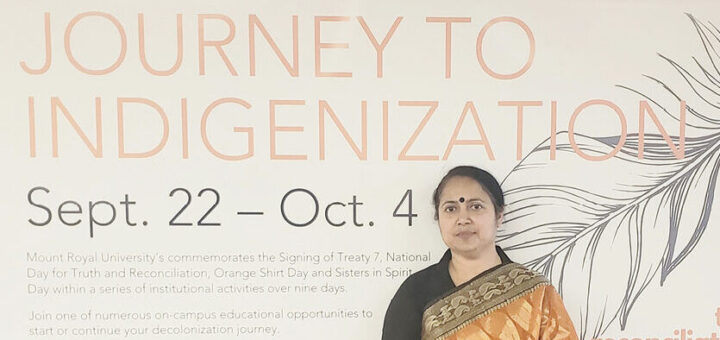Expression through orange sarees

Mikaela Delos Santos, Publishing Editor |
At age 23, Dr. Jebunessa Chapola left her home country of Bangladesh to study abroad. It was also at age 23 that she realized the country she was born and raised in was deeply colonized.
“Though [decolonial] education is not very much available [in Bangladesh], through informal learning spaces and through my family education, I started to learn that Bangladesh has a colonized history— India has a colonized history.”
A feminist researcher passionate about decolonial studies, Chapola tells me stories of what it was like growing up in Bangladesh.
“My homeland is highly patriarchal, and highly sexist. And women used to face lots of challenges to live as a human being, I would say, religious racism was very high that I have experienced. But during my generation, when I was growing up, it was not that [much] worse, like, currently, it’s really, really worse.”
“By saying all of these things after leaving my home country more than 20 years now, I can see that these are mostly the consequences of colonization. I didn’t have this realization before, but as a diasporic woman here in Canada, and also as an anti-racist, anti-colonial scholar I can say it out loud that, yeah, in Bangladesh, when I grew up, I didn’t have the opportunity to have decolonial and anti-racist education.”
Currently, Chapola is a sessional lecturer in Mount Royal University’s (MRU) General Education department. Before coming to Canada, she received various academic accolades from Sweden, Norway, and the U.S.
For Chapola, immigrating to Canada saved her life. It was also in Canada where a lot of her passion for decolonialism further developed.
“After so many years [from when I left Bangladesh], I felt that I’m so committed and I’m so passionate to be an advocate for the Adivasi people back home.”
“I was hearing so many stories about orange shirts, the red dress day, and also Truth and Reconciliation. All this made me committed once again to be a researcher and where I decided to be an advocate for building relationships with Indigenous and non-Indigenous people.”
Chapola also considers herself an artist. Her art? Saree wrapping.
In various multicultural festivals Chapola uses sarees produced by artisans in Bangladesh and India where she shares the art of saree-wrapping with festival goers.
“But this orange color saree wrapping it, I do it only for myself.”
Orange sarees for Chapola is a means of expressing social feminist messages through her own body. Sarees are Chapola’s art and identity, both as a scholar and artist.
“I mean, that’s my way of doing it. [For a] long time I’m doing it.”
As a scholar, she found it hard to convey her messages to a broader audience.
“I tried to bring this piece as an anti-racist performance piece. Since I’m on my training, I’m an anti-racist scholar. So, around the community, how many people understand your scholarly talk? Right? And scholarly presentations?”
Along with the orange sarees, Chapola also wears a black blouse.
“I use [a black blouse] because black symbolizes a sad colour back home. So black represents my Bengali culture. And orange represents here in Canada.”
“Whenever I go for any Indigenous event, or not only Indigenous events actually, [whenever] I get the opportunity to present my doctoral work, I wear this orange saree . Why? Because I think I feel more committed and I feel that it tells a lot. By showing my appearance in front of the public, it has a silent language that otherwise I need to tell a lot.”



